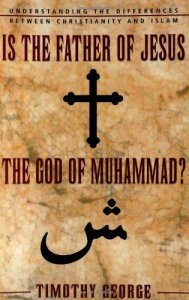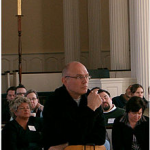
Do Muslims and Christians, as Pope Francis re-asserted last week, worship the same God? After the recent suspension of Wheaton college professor Larycia Alaine Hawkins, for her explanation[i] of why she is wearing a hijab during Advent to show solidarity with Islam, this topic is on many people’s minds.
As we confessional Lutherans like to say, there arise moments in the church’s life where giving a clear confession is essential. This is called being in “statu confessionis”.
This, I submit, is one of those times. “Is”, as Christianity Today editor Timothy George succinctly put it years ago, “the Father of Jesus the God of Muhammad?”
Rod Dreher, writing at the American Conservative blog, is not sure what to think about this. Though he supports Wheaton, respecting it for holding the line regarding its convictions, he writes:
To be honest, I’ve never thought at all about whether Muslims pray to the same God as Christians. The Catholic Church teaches that they do, and that was my belief when I was a Catholic, though I never gave it a minute’s thought. I don’t know what I believe now, to be honest. We know that Muslims do not pray to the Holy Trinity — but this is also true of Jews. Don’t Christians (most Christians) believe that Jews pray to the one true God, even if they have an imperfect understanding of His nature? If this is true for Jews, why not also for Muslims, who clearly adhere to an Abrahamic religion? This is why my tendency is to assume that Muslims do pray to the one true God, even though they have a radically impaired view of Him.
…I mean, I assume, in charity, that people who intend their prayers to be to the God of Abraham, Isaac, and Jacob are praying to the true God, whatever they lack in theological understanding. But again, I’ve not given this much thought.

Men like James K.A. Smith, Peter Enns, and Miroslav Volf have all surely given this a lot more thought than Rod Dreher, and all of them, pointing to “unknown God” in Acts 17, essentially imply that Hawkin’s comments are “wise and necessary” on “Christian grounds.” (Enns) [ii]
In her defense, Hawkins cited a 2011 Christianity Today interview with Volf, where he said:
“all Christians don’t worship the same God, and all Muslims don’t worship the same God. But I think that Muslims and Christians who embrace the normative traditions of their faith refer to the same object, to the same Being, when they pray, when they worship, when they talk about God. The referent is the same. The description of God is partly different.”[iii] (italics mine)
In his new Washington Post editorial titled “Wheaton professor’s suspension is about anti-Muslim bigotry, not theology”, Volf asks:
“Why is the Christian response to Muslim denial of the Trinity and the incarnation not the same as the response to similar Jewish denial? Why are many Christians today unable to say that Christians and Muslims worship the same God but understand God in partly different ways?”
I’ll let the folks at Wheaton handle that question about this purported double-standard, but here is my own question for Dr. Wolf and anyone else resonating with his views:
“If, in John 8, Jesus tells us that the sons of Abraham and Isaac do not believe in the true God, how might this apply to the sons Abraham and Ishmael?”
Go read John chapter 8 right now and tell me what you think. None of this means that there is not valuable nuance to be introduced in this discussion (see what Martin Luther wrote in the Smalcald Articles, a part of the 1580 Lutheran Book of Concord here), but times such as this do demand a clear answer. And I submit that for all the questions left unanswered by John 8, we are also left with many answers – even if they are very uncomfortable answers.
Mr. Volf should heartily apologize for saying that Wheaton’s stance is about “enmity toward Muslims”. Further, this has absolutely nothing to do with the current politics concerning ISIS. The administration is taking the stand that they do not because they hate Muslims but because they love Jesus Christ, who loves all persons, and died for their sins.
Is the eldery British man in this video showing enmity towards Muslims? Or is he actually loving them? I might say “that’s not my style of evangelism”, but I certainly cannot accuse him of hate!
As he ends “Jesus suffered and died on the cross that you might have eternal life”.
I am pretty sure that Allah, on the other hand, would never do that. In short, I think this is all very simple:
“Thank God Jesus is God!”
FIN
Notes:
[i] From Christianity Today: “In a statement released late Wednesday night, the college said that Hawkins was free to wear a headscarf as an act of care and compassion towards Muslims.”
[ii] I suggest the most significant part of Acts 17 is the end of the chapter, where Paul essentially tells the audience that they are without excuse if they do not listen to Jesus Christ, whom God has raised from the dead to prove Him to be Judge on the Last Day. He can use the “unknown God” to his advantage precisely because there is nothing that can be positively said about this unknown God. This is not the case regarding Allah, or even Jewish conceptions of God that reject Jesus Christ. Francis Beckwith’s answer is therefore unhelpful as well. On patheos’ evangelical channel, Scot McKnight is more helpful than Roger Olsen.
[iii] Christianity Today also notes: “Volf made a similar argument while speaking at Wheaton in 2011.
He told students that God, as understood by Christians, and Allah, as understood by Muslims, are very similar but not identical.
“My statement is that there is sufficiently similarity between Muslim and Christian conceptions of God, so that we can say that they worship the same and similarly understood God,” he told students, “which provides the basis for very significant common values.”
Citing Volf’s speech, Grant noted in his defense of Hawkins that “Wheaton does not endorse every speaker who comes to campus, but one could excuse a professor who borrows a phrase spoken from a theologian Wheaton brought to campus to speak on how Christians should interact with Muslims.”












